Physical activity improves quality of life
- 格式:doc
- 大小:35.50 KB
- 文档页数:2
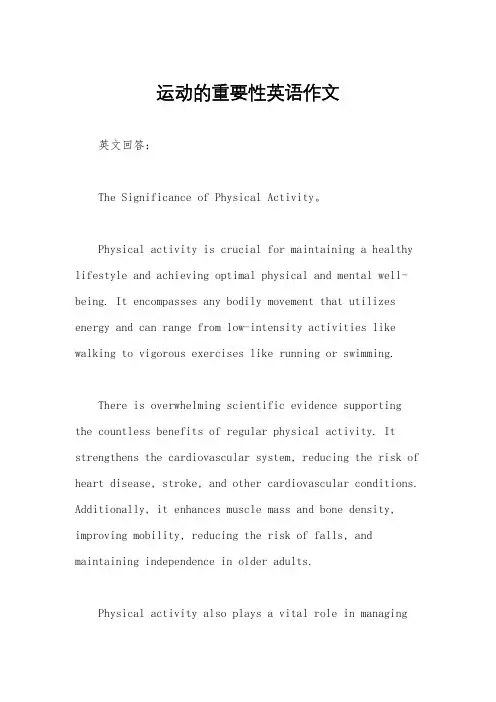
运动的重要性英语作文英文回答:The Significance of Physical Activity。
Physical activity is crucial for maintaining a healthy lifestyle and achieving optimal physical and mental well-being. It encompasses any bodily movement that utilizes energy and can range from low-intensity activities like walking to vigorous exercises like running or swimming.There is overwhelming scientific evidence supporting the countless benefits of regular physical activity. It strengthens the cardiovascular system, reducing the risk of heart disease, stroke, and other cardiovascular conditions. Additionally, it enhances muscle mass and bone density, improving mobility, reducing the risk of falls, and maintaining independence in older adults.Physical activity also plays a vital role in managingweight and preventing obesity. By burning calories and regulating appetite, it helps maintain a healthy body weight. Furthermore, it improves glucose metabolism, reducing the risk of developing type 2 diabetes.Moreover, physical activity has profound effects on mental health. It releases endorphins, which have mood-boosting properties, reducing symptoms of depression and anxiety. It also enhances cognitive function, improves sleep quality, and increases self-esteem.Incorporating physical activity into daily life can be effortless. Simple changes like taking the stairs instead of the elevator, walking or cycling to run errands, or engaging in active hobbies can significantly increase activity levels. Aim for at least 150 minutes of moderate-intensity aerobic activity or 75 minutes of vigorous-intensity aerobic activity per week.中文回答:运动的重要性。
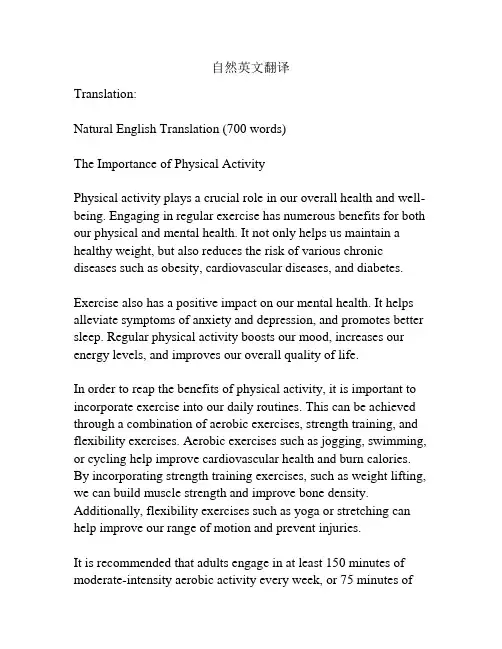
自然英文翻译Translation:Natural English Translation (700 words)The Importance of Physical ActivityPhysical activity plays a crucial role in our overall health and well-being. Engaging in regular exercise has numerous benefits for both our physical and mental health. It not only helps us maintain a healthy weight, but also reduces the risk of various chronic diseases such as obesity, cardiovascular diseases, and diabetes.Exercise also has a positive impact on our mental health. It helps alleviate symptoms of anxiety and depression, and promotes better sleep. Regular physical activity boosts our mood, increases our energy levels, and improves our overall quality of life.In order to reap the benefits of physical activity, it is important to incorporate exercise into our daily routines. This can be achieved through a combination of aerobic exercises, strength training, and flexibility exercises. Aerobic exercises such as jogging, swimming, or cycling help improve cardiovascular health and burn calories. By incorporating strength training exercises, such as weight lifting, we can build muscle strength and improve bone density. Additionally, flexibility exercises such as yoga or stretching can help improve our range of motion and prevent injuries.It is recommended that adults engage in at least 150 minutes of moderate-intensity aerobic activity every week, or 75 minutes ofvigorous-intensity aerobic activity. In addition, muscle-strengthening activities should be performed at least two days per week. For children and adolescents, it is recommended that they engage in at least 60 minutes of moderate to vigorous intensity physical activity every day.Incorporating physical activity into our daily lives does not have to be a daunting task. Small changes can make a big difference. Taking the stairs instead of the elevator, walking or cycling to nearby destinations instead of driving, and incorporating short bursts of physical activity throughout the day can all contribute to a more active lifestyle.One of the most effective ways to stay motivated is to find an activity that we enjoy. This could be anything from dancing, playing a sport, or going for a hike. By finding something that we genuinely enjoy, we are more likely to stick with it in the long-term. It is also important to set realistic goals and track our progress. This can help us stay motivated and provide a sense of accomplishment as we reach our milestones.In conclusion, physical activity is a critical component of a healthy lifestyle. It not only helps us maintain a healthy weight, but also reduces the risk of chronic diseases and promotes mental well-being. By incorporating exercise into our daily routines and finding activities that we enjoy, we can improve our overall health and quality of life. Remember, even small changes can make a big difference!。
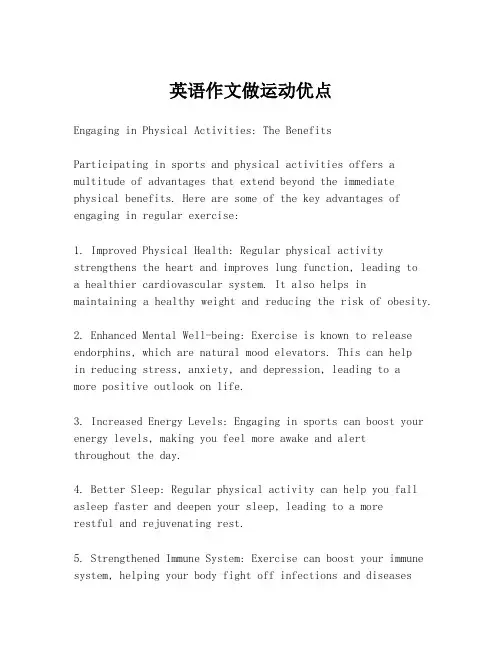
英语作文做运动优点Engaging in Physical Activities: The BenefitsParticipating in sports and physical activities offers a multitude of advantages that extend beyond the immediate physical benefits. Here are some of the key advantages of engaging in regular exercise:1. Improved Physical Health: Regular physical activity strengthens the heart and improves lung function, leading toa healthier cardiovascular system. It also helps inmaintaining a healthy weight and reducing the risk of obesity.2. Enhanced Mental Well-being: Exercise is known to release endorphins, which are natural mood elevators. This can helpin reducing stress, anxiety, and depression, leading to amore positive outlook on life.3. Increased Energy Levels: Engaging in sports can boost your energy levels, making you feel more awake and alertthroughout the day.4. Better Sleep: Regular physical activity can help you fall asleep faster and deepen your sleep, leading to a morerestful and rejuvenating rest.5. Strengthened Immune System: Exercise can boost your immune system, helping your body fight off infections and diseasesmore effectively.6. Improved Cognitive Function: Physical activities have been linked to improved memory, concentration, and cognitive function, which can be particularly beneficial for students and professionals.7. Social Interaction: Sports often involve teamwork and interaction with others, which can help in developing social skills and building lasting friendships.8. Discipline and Time Management: Training for a sport requires commitment and dedication, which can help in developing discipline and better time management skills.9. Increased Self-Confidence: Achieving goals in sports can boost self-esteem and confidence, as it provides a sense of accomplishment and self-worth.10. Longevity: Regular exercise has been associated with a longer life expectancy, as it helps in preventing various chronic diseases.In conclusion, engaging in physical activities is not just about staying fit; it's a holistic approach to improvingone's overall quality of life. Whether it's for fun, competition, or personal development, sports and exercise should be an integral part of everyone's routine.。
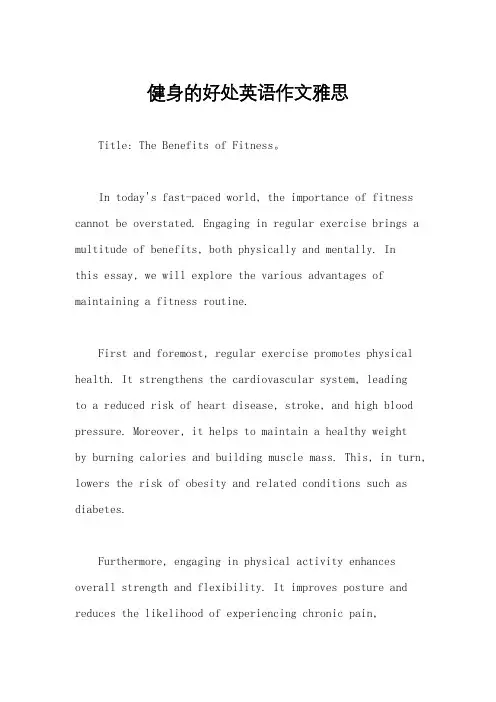
健身的好处英语作文雅思Title: The Benefits of Fitness。
In today's fast-paced world, the importance of fitness cannot be overstated. Engaging in regular exercise brings a multitude of benefits, both physically and mentally. Inthis essay, we will explore the various advantages of maintaining a fitness routine.First and foremost, regular exercise promotes physical health. It strengthens the cardiovascular system, leadingto a reduced risk of heart disease, stroke, and high blood pressure. Moreover, it helps to maintain a healthy weightby burning calories and building muscle mass. This, in turn, lowers the risk of obesity and related conditions such as diabetes.Furthermore, engaging in physical activity enhances overall strength and flexibility. It improves posture and reduces the likelihood of experiencing chronic pain,particularly in the back and joints. By strengthening muscles and bones, exercise also lowers the risk of osteoporosis, especially in older adults.Beyond physical health, fitness has significant benefits for mental well-being. Exercise stimulates the release of endorphins, often referred to as "feel-good" hormones, which can alleviate stress, anxiety, and depression. Many individuals find that regular physical activity boosts their mood and enhances their overall quality of life.Moreover, participating in fitness activities provides opportunities for social interaction and community engagement. Whether it's joining a sports team, attending group exercise classes, or simply walking in the park with a friend, exercising with others fosters a sense of belonging and camaraderie. This social aspect of fitness can help combat feelings of isolation and loneliness, particularly in today's increasingly digital world.In addition to the immediate benefits, maintaining afitness routine can have long-term positive effects on cognitive function. Research has shown that regular exercise can improve memory, concentration, and overall brain health. It may even help to reduce the risk of cognitive decline and dementia as we age.Furthermore, adopting a fitness mindset often leads to other healthy habits, such as better nutrition and improved sleep patterns. When individuals prioritize their physical well-being, they are more likely to make positive choices in other areas of their lives, leading to a holistic approach to health and wellness.In conclusion, the benefits of fitness are manifold, encompassing improvements in physical health, mental well-being, social connectedness, and cognitive function. By incorporating regular exercise into our lives, we can enhance our overall quality of life and enjoy a greater sense of vitality and fulfillment.。
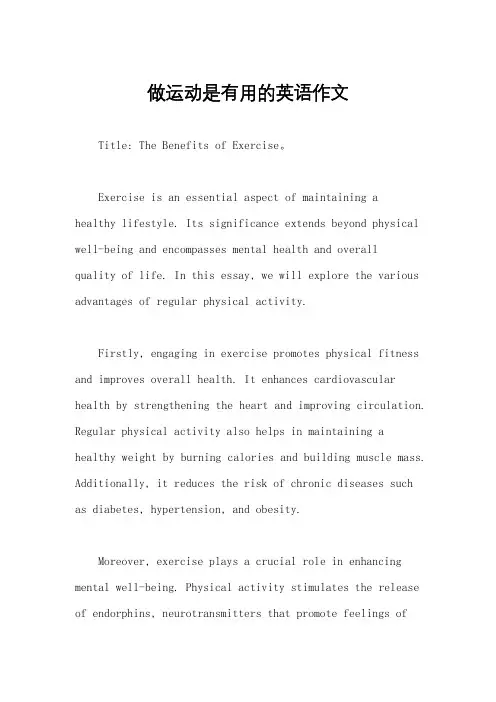
做运动是有用的英语作文Title: The Benefits of Exercise。
Exercise is an essential aspect of maintaining ahealthy lifestyle. Its significance extends beyond physical well-being and encompasses mental health and overallquality of life. In this essay, we will explore the various advantages of regular physical activity.Firstly, engaging in exercise promotes physical fitness and improves overall health. It enhances cardiovascular health by strengthening the heart and improving circulation. Regular physical activity also helps in maintaining a healthy weight by burning calories and building muscle mass. Additionally, it reduces the risk of chronic diseases such as diabetes, hypertension, and obesity.Moreover, exercise plays a crucial role in enhancing mental well-being. Physical activity stimulates the release of endorphins, neurotransmitters that promote feelings ofhappiness and reduce stress and anxiety. Regular exercise has been linked to improved mood, better sleep quality, and enhanced cognitive function. It serves as a natural antidote to depression and other mental health disorders.Furthermore, participating in sports and other forms of physical activity fosters social interaction and builds community. Whether it's joining a sports team, attending fitness classes, or simply exercising outdoors, individuals have the opportunity to connect with others who share similar interests. This social support network not only provides motivation but also creates a sense of belonging and camaraderie.In addition to the physical and mental benefits, exercise also contributes to overall quality of life. It boosts energy levels and improves productivity, allowing individuals to perform daily tasks more efficiently. Regular physical activity also enhances self-esteem andself-confidence as individuals achieve their fitness goals and witness improvements in their physical abilities.Furthermore, exercise serves as a powerful stress reliever in today's fast-paced world. Whether it's a brisk walk in nature, a yoga session, or a workout at the gym, engaging in physical activity helps individuals unwind and recharge. It provides a much-needed break from thepressures of work and personal life, allowing forrelaxation and rejuvenation.Moreover, exercise promotes longevity and healthy aging. Studies have shown that individuals who maintain an active lifestyle tend to live longer and enjoy a higher quality of life in their later years. Regular physical activity helps preserve muscle mass, bone density, and cognitive function, reducing the risk of age-related decline and disease.In conclusion, exercise is undeniably beneficial for both physical and mental health. Its positive effectsextend beyond the physical realm and encompass various aspects of well-being, including emotional, social, and psychological aspects. By incorporating regular physical activity into our daily lives, we can improve our overall health and enjoy a higher quality of life.。
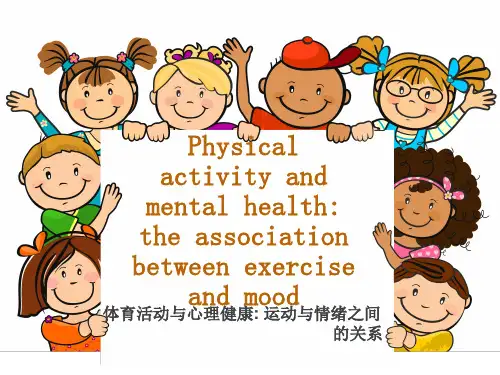
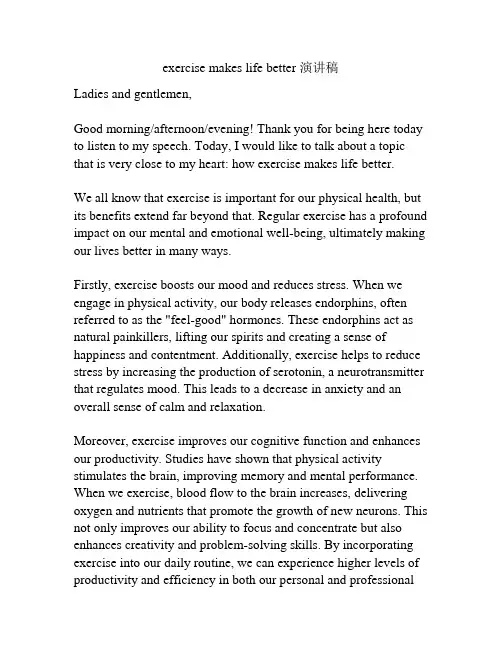
exercise makes life better 演讲稿Ladies and gentlemen,Good morning/afternoon/evening! Thank you for being here today to listen to my speech. Today, I would like to talk about a topic that is very close to my heart: how exercise makes life better.We all know that exercise is important for our physical health, but its benefits extend far beyond that. Regular exercise has a profound impact on our mental and emotional well-being, ultimately making our lives better in many ways.Firstly, exercise boosts our mood and reduces stress. When we engage in physical activity, our body releases endorphins, often referred to as the "feel-good" hormones. These endorphins act as natural painkillers, lifting our spirits and creating a sense of happiness and contentment. Additionally, exercise helps to reduce stress by increasing the production of serotonin, a neurotransmitter that regulates mood. This leads to a decrease in anxiety and an overall sense of calm and relaxation.Moreover, exercise improves our cognitive function and enhances our productivity. Studies have shown that physical activity stimulates the brain, improving memory and mental performance. When we exercise, blood flow to the brain increases, delivering oxygen and nutrients that promote the growth of new neurons. This not only improves our ability to focus and concentrate but also enhances creativity and problem-solving skills. By incorporating exercise into our daily routine, we can experience higher levels of productivity and efficiency in both our personal and professionallives.Furthermore, exercise strengthens our relationships and social connections. Whether it's going for a run with a friend, participating in a group fitness class, or joining a sports team, exercise provides an opportunity to engage with others and build meaningful connections. Working out together fosters a sense of camaraderie and community, allowing us to forge new friendships and strengthen existing ones. These social interactions are essential for our overall sense of belonging and well-being, leading to greater happiness in our lives.Lastly, exercise improves our quality of life as we age. Regular physical activity has been shown to reduce the risk of many chronic diseases, including cardiovascular disease, diabetes, and certain types of cancer. Moreover, it helps to maintain muscle strength and flexibility, preventing age-related decline in physical function. By staying active throughout our lives, we can enjoy better health, independence, and an improved overall quality of life as we grow older.In conclusion, exercise is not just about building a strong and healthy body. It has a profound impact on our mental and emotional well-being, enhancing our mood, reducing stress, improving cognitive function, and strengthening relationships. Furthermore, regular physical activity improves our overall quality of life, allowing us to age gracefully and enjoy good health for years to come. So, let's make exercise a priority in our lives and experience the countless benefits it brings. Remember, exercise makes life better!Thank you!。
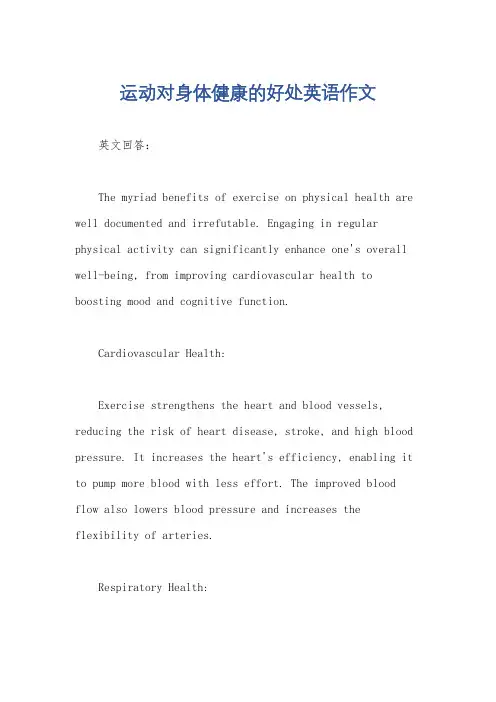
运动对身体健康的好处英语作文英文回答:The myriad benefits of exercise on physical health are well documented and irrefutable. Engaging in regular physical activity can significantly enhance one's overall well-being, from improving cardiovascular health to boosting mood and cognitive function.Cardiovascular Health:Exercise strengthens the heart and blood vessels, reducing the risk of heart disease, stroke, and high blood pressure. It increases the heart's efficiency, enabling it to pump more blood with less effort. The improved blood flow also lowers blood pressure and increases theflexibility of arteries.Respiratory Health:Physical activity strengthens the respiratory system by increasing lung capacity and improving oxygen uptake. It enhances the diaphragm's function, allowing for deeper breathing and more efficient gas exchange. Regular exercise also improves airway function, reducing the risk of asthma and other respiratory issues.Musculoskeletal Health:Exercise builds and strengthens muscles, bones, and joints. Weight-bearing exercises such as walking, running, and dancing increase bone density, reducing the risk of osteoporosis. Resistance training, such as weightlifting, helps maintain muscle mass and strength, which is essential for mobility, balance, and overall physical performance.Flexibility and Mobility:Regular stretching and flexibility exercises improve the range of motion in joints and muscles, enhancing mobility and reducing the risk of injuries. Stretching also helps maintain proper posture and reduce muscle tension.Weight Management:Exercise is a crucial component of weight management. It burns calories and increases metabolic rate, making it easier to maintain a healthy weight. Physical activity also helps regulate appetite hormones, reducing cravings and promoting satiety.Mood and Cognitive Function:Exercise releases endorphins, which have mood-boosting effects. It reduces stress, anxiety, and depression. Physical activity also improves cognitive function by increasing blood flow to the brain, promoting memory, and enhancing problem-solving abilities.Injury Prevention:Regular exercise strengthens muscles and improves balance, reducing the risk of falls and other injuries. It also increases joint stability and flexibility, which canhelp prevent sprains, strains, and other musculoskeletal issues.Chronic Disease Management:Exercise can help manage chronic diseases such as diabetes, arthritis, and cancer. It improves insulin sensitivity, reduces joint pain and stiffness, and strengthens the immune system. Regular physical activity can also reduce the risk of developing certain chronic diseases.Improved Quality of Life:Overall, exercise significantly improves one's quality of life. It increases energy levels, promotes a sense of well-being, and enhances physical and mental performance. Regular physical activity can also boost self-esteem, reduce the risk of chronic diseases, and extend life expectancy.中文回答:定期运动对身体健康的益处。
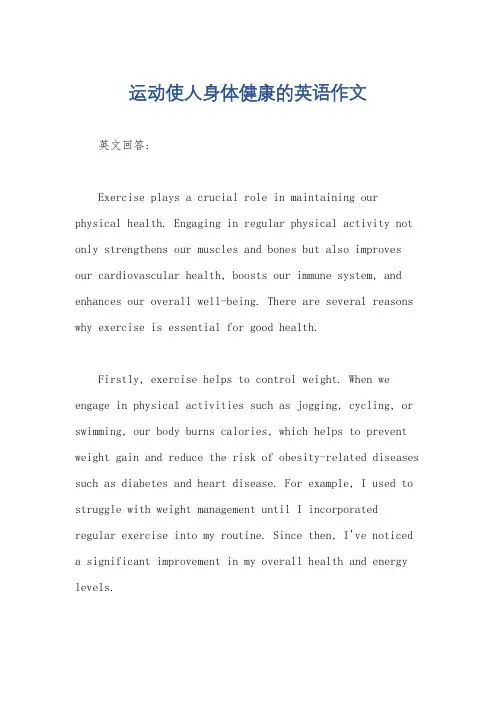
运动使人身体健康的英语作文英文回答:Exercise plays a crucial role in maintaining our physical health. Engaging in regular physical activity not only strengthens our muscles and bones but also improves our cardiovascular health, boosts our immune system, and enhances our overall well-being. There are several reasons why exercise is essential for good health.Firstly, exercise helps to control weight. When we engage in physical activities such as jogging, cycling, or swimming, our body burns calories, which helps to prevent weight gain and reduce the risk of obesity-related diseases such as diabetes and heart disease. For example, I used to struggle with weight management until I incorporated regular exercise into my routine. Since then, I've noticed a significant improvement in my overall health and energy levels.Secondly, exercise promotes better sleep. Regular physical activity helps to regulate our sleep patterns and improves the quality of our sleep. When we exercise, our body releases endorphins, which are chemicals that promote feelings of happiness and relaxation, making it easier for us to fall asleep and stay asleep throughout the night. Personally, I've experienced this firsthand on days when I exercise, I tend to sleep more soundly and wake up feeling refreshed and energized.Moreover, exercise is essential for maintaining mental health. Physical activity has been shown to reduce symptoms of anxiety, depression, and stress by increasing the production of serotonin, a neurotransmitter that regulates mood and promotes feelings of happiness and well-being. For instance, whenever I feel stressed or anxious, going for a run or attending a yoga class helps me clear my mind and feel more relaxed and focused.Furthermore, exercise strengthens our immune system, making us less susceptible to illnesses and infections. Regular physical activity helps to flush bacteria out ofthe lungs and airways, increases circulation, and promotes the production of antibodies, all of which contribute to a stronger immune system. As a result, people who exercise regularly tend to have fewer colds and respiratoryinfections compared to those who are sedentary.In conclusion, exercise is crucial for maintaining good health. By incorporating regular physical activity into our daily routine, we can control our weight, improve our sleep, boost our mood, and strengthen our immune system. Whetherit's going for a walk, hitting the gym, or playing sports, finding an activity that we enjoy and can stick to is keyto reaping the numerous benefits of exercise.中文回答:运动对保持我们的身体健康起着至关重要的作用。
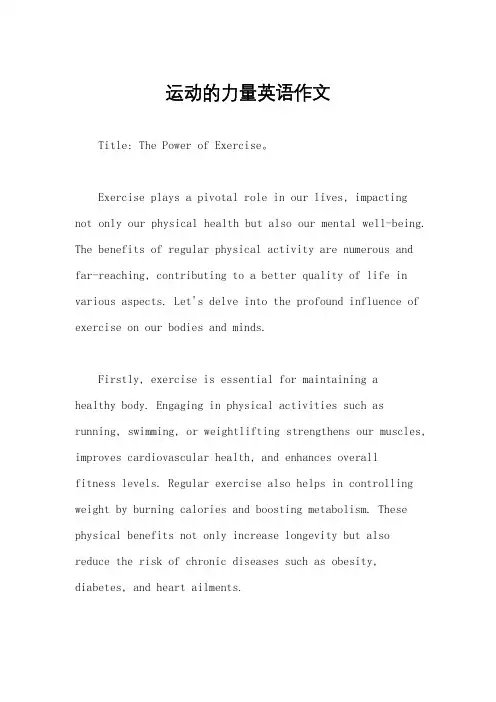
运动的力量英语作文Title: The Power of Exercise。
Exercise plays a pivotal role in our lives, impactingnot only our physical health but also our mental well-being. The benefits of regular physical activity are numerous and far-reaching, contributing to a better quality of life in various aspects. Let's delve into the profound influence of exercise on our bodies and minds.Firstly, exercise is essential for maintaining ahealthy body. Engaging in physical activities such as running, swimming, or weightlifting strengthens our muscles, improves cardiovascular health, and enhances overallfitness levels. Regular exercise also helps in controlling weight by burning calories and boosting metabolism. These physical benefits not only increase longevity but also reduce the risk of chronic diseases such as obesity, diabetes, and heart ailments.Moreover, exercise has a profound impact on mental health. Physical activity stimulates the release of endorphins, often referred to as the "feel-good" hormones, which alleviate stress and elevate mood. Regular exercise is linked to reduced symptoms of anxiety and depression, promoting mental clarity and emotional resilience. Additionally, participating in group exercises fosters social connections and a sense of belonging, further enhancing psychological well-being.Furthermore, exercise is instrumental in enhancing cognitive function. Studies have shown that physical activity improves memory, concentration, and overall brain health. Regular exercise increases blood flow to the brain, delivering oxygen and nutrients essential for optimal cognitive performance. Moreover, engaging in physical activities that require coordination and agility, such as dancing or martial arts, enhances neuroplasticity, the brain's ability to adapt and learn.Beyond the individual benefits, exercise also has a positive impact on society as a whole. Communities thatprioritize physical activity often have lower healthcare costs associated with preventable diseases. Additionally, promoting exercise in schools and workplaces improves productivity and reduces absenteeism. Moreover, investingin recreational facilities and public spaces for physical activities fosters a sense of community and civic engagement.However, despite the myriad benefits of exercise, many people struggle to incorporate it into their daily routines. Factors such as busy lifestyles, lack of motivation, and accessibility to exercise facilities contribute tosedentary behaviors. Addressing these barriers requires a multifaceted approach, including education on theimportance of exercise, creating supportive environments, and providing accessible opportunities for physicalactivity.In conclusion, exercise is a powerful force that positively impacts our physical health, mental well-being, and cognitive function. Its benefits extend beyond the individual to society as a whole, contributing to ahealthier and happier population. By prioritizing regular physical activity and overcoming barriers to exercise, we can harness the transformative power of movement and lead fulfilling lives.。
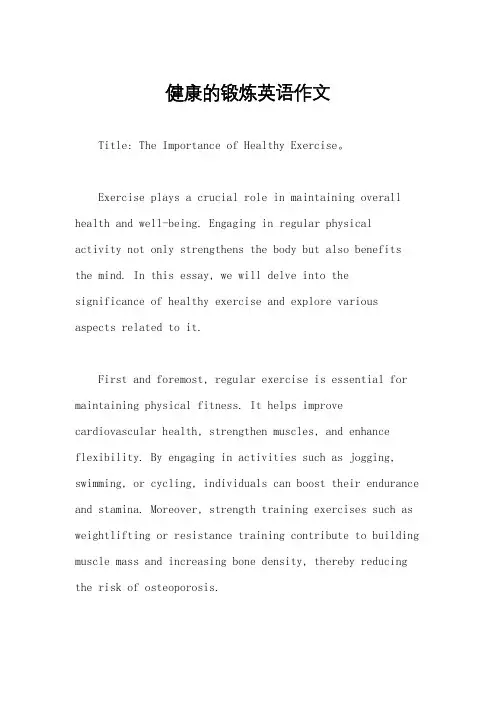
健康的锻炼英语作文Title: The Importance of Healthy Exercise。
Exercise plays a crucial role in maintaining overall health and well-being. Engaging in regular physicalactivity not only strengthens the body but also benefits the mind. In this essay, we will delve into thesignificance of healthy exercise and explore various aspects related to it.First and foremost, regular exercise is essential for maintaining physical fitness. It helps improve cardiovascular health, strengthen muscles, and enhance flexibility. By engaging in activities such as jogging, swimming, or cycling, individuals can boost their endurance and stamina. Moreover, strength training exercises such as weightlifting or resistance training contribute to building muscle mass and increasing bone density, thereby reducing the risk of osteoporosis.In addition to its physical benefits, exercise also has a profound impact on mental health. Physical activity stimulates the production of endorphins, neurotransmitters that promote feelings of happiness and reduce stress. Regular exercise has been linked to improved mood, increased self-esteem, and better sleep quality. Furthermore, participating in group activities or team sports fosters social interaction and provides a sense of belonging, which is crucial for mental well-being.Another important aspect of healthy exercise is itsrole in preventing chronic diseases. Leading a sedentary lifestyle is associated with an increased risk of conditions such as obesity, type 2 diabetes, and heart disease. By incorporating regular physical activity into one's routine, individuals can effectively manage their weight, control blood sugar levels, and lower blood pressure. Moreover, exercise helps improve circulation and strengthens the immune system, reducing the likelihood of developing various illnesses.Furthermore, healthy exercise promotes cognitivefunction and brain health. Studies have shown that physical activity enhances cognitive abilities such as memory, attention, and problem-solving skills. Regular exercise also reduces the risk of cognitive decline and dementia in older adults. Additionally, engaging in activities that require coordination and balance, such as yoga or tai chi, can help maintain brain health and prevent falls.It is important to note that the benefits of exercise extend beyond the physical and mental realms. Regular physical activity also promotes longevity and improves overall quality of life. By adopting a healthy lifestyle that includes exercise, individuals can increase their life expectancy and enjoy a higher level of independence as they age.In conclusion, healthy exercise is vital for maintaining overall health and well-being. From improving physical fitness to enhancing mental health and preventing chronic diseases, the benefits of regular physical activity are undeniable. By incorporating exercise into our dailylives, we can lead happier, healthier, and more fulfilling lives.。
我认为在空闲时间应该通过锻炼来提高自己的身心素质的英语作文Living longer, feeling good and looking good are three ideals in today's world, one of the keys to achieve these goals is exercise. You are never too old, to young or too unfit to get started. Regardless of your age or gender you can benefit from regular physical activity, all you need is determination and commitment.Health specialists recommend at least 30 minutes of moderately physical activity on every day of the week; walking, running, cycling, swimming or any other moderate activities that include the use of muscles. It is not necessary to find an specific exercise program to be healthy, try working with a little more movement as taking the stairs instead of the elevator, getting off public transportation a few blocks before your stop, getting up from your desk to stretch and walk around, carrying your own groceries, etc.Regular physical exercise improves the functioning of your immune system, which can help prevent illness and it lowers the risk of getting heart attacks and strokes. Exercising helps control blood pressure, it reduces cholesterol and it helps relieve and prevent migraine headache attacks.Your mind is as important as your body and exercise helps you feel well; you manage stress more effectively and it reduces anxiety. When you exercise it helps you alleviate depression when you are having problems at home, work or at school. Once you start exercising you will learn how to relax more often therefore your quality of sleep will improve.When physical activities become part of your daily routine your overall quality of life improves, you feel in better shape and you notice the increase of level in your muscular strength as well as the ability to do continuous work. You see results in your appearance; you lose weight and your muscles get toned as a result your self-image improves. Being involved in new physical exercise increases the opportunity to meet new people and to share activities that can help you keep up with your exercise.Living longer, feeling good and looking good is not that impossible to achieve. You can probably come up with plenty of excuses to not exercise. You are too young, you are too old or you are too tired however if you truly want to improve your physical and mental health you will find time and energy to get in good shape. The benefits of exercising are extremely rewarding and worthwhile.。
Exercising is a vital part of maintaining a healthy lifestyle.It not only strengthens our physique but also enhances our mental wellbeing.Engaging in regular physical activities can lead to numerous benefits that contribute to a better quality of life.Firstly,regular exercise helps in building and maintaining strong muscles and bones.It increases the density of our bones,reducing the risk of osteoporosis and fractures as we age.Moreover,it improves muscle strength,which is essential for daily activities and for maintaining balance and coordination.Secondly,engaging in physical activities on a consistent basis aids in weight management.It helps in burning calories and reducing body fat,which in turn lowers the risk of obesity and its associated health issues such as diabetes,heart diseases,and high blood pressure.Thirdly,exercise is known to boost the immune system.It helps in fighting off infections and diseases by stimulating the production of white blood cells,which are the bodys primary defense against pathogens.Furthermore,regular physical activity is beneficial for mental health.It has been proven to reduce stress,anxiety,and depression by releasing endorphins,which are natural mood elevators.Exercise also improves sleep quality,which is crucial for overall health and wellbeing.In addition,engaging in sports or group exercises can foster a sense of community and social interaction.It can help in building relationships,improving communication skills, and boosting selfesteem.Lastly,exercise can contribute to cognitive health by improving memory,focus,and cognitive function.It has been linked to a reduced risk of developing neurodegenerative diseases such as Alzheimers and Parkinsons.In conclusion,incorporating exercise into our daily routine is essential for a healthy and fulfilling life.It is not just about physical strength but also about nurturing our mental and emotional wellbeing.By making a conscious effort to stay active,we can reap the numerous benefits that exercise has to offer and lead a more vibrant and energetic life.。
要加强体育锻炼的作文英语Title: The Importance of Enhancing Physical Exercise。
Physical exercise plays a crucial role in maintaining our overall well-being and leading a healthy lifestyle. In today's fast-paced world, where sedentary lifestyles and technological advancements are prevalent, the significance of regular physical activity cannot be emphasized enough. In this essay, we will delve into the various reasons why enhancing physical exercise is essential.Firstly, engaging in regular physical exercise is vital for maintaining optimal physical health. Exercise helps to strengthen our muscles, bones, and joints, thereby reducing the risk of various health conditions such as obesity, heart disease, and diabetes. It also enhances cardiovascular health by improving blood circulation and lowering blood pressure. Moreover, regular exercise boosts the immune system, making us more resistant to illnesses and infections.Furthermore, physical exercise is closely linked to mental well-being. Exercise stimulates the release of endorphins, neurotransmitters that promote feelings of happiness and reduce stress and anxiety. It has been scientifically proven that regular physical activity can alleviate symptoms of depression and improve overall mood. Additionally, participating in sports or other forms of physical activity fosters social interaction and can help individuals build strong relationships and a sense of community.In addition to its physical and mental benefits, enhancing physical exercise also contributes to personal development. Engaging in sports or fitness activities teaches valuable life skills such as discipline, perseverance, and teamwork. It instills a sense of goal-setting and achievement, as individuals strive to improve their performance and reach new milestones. Moreover, physical exercise provides opportunities for personal growth and self-discovery, as individuals push their limits and overcome challenges.Another important aspect of enhancing physical exercise is its impact on academic and professional success. Research has shown that regular exercise improves cognitive function, including memory, attention, and problem-solving skills. Students who engage in physical activity often perform better academically, as exercise enhances brain function and increases concentration levels. Similarly, professionals who prioritize physical fitness are more productive and resilient, as exercise improves focus and energy levels.Moreover, promoting physical exercise contributes to the development of a healthier society as a whole. By encouraging individuals to lead active lifestyles, we can reduce the burden on healthcare systems and mitigate the prevalence of chronic diseases. Additionally, investing in sports and recreational facilities creates employment opportunities and stimulates economic growth. Furthermore, promoting physical activity among youth helps to combat issues such as childhood obesity and instills lifelong habits of health and fitness.In conclusion, enhancing physical exercise is crucialfor maintaining overall health, promoting mental well-being, fostering personal development, and contributing to academic and professional success. By prioritizing regular physical activity, individuals can lead happier, more fulfilling lives, while also benefiting society as a whole. It is essential for governments, communities, andindividuals to work together to create environments that facilitate and encourage physical exercise for all ages and abilities. Only through collective effort can we truly realize the full potential of physical activity inimproving quality of life.。
College Students' Lack of ExerciseIn recent years, the issue of college students' lack of exercise has become increasingly prominent. With the rise of technology and the convenience of modern lifestyles, many students find themselves engrossed in studies, social media, and other sedentary activities, neglecting the importance of physical exercise. This trend is not only detrimental to their physical health but also affects their mental well-being and overall quality of life.Firstly, the lack of exercise in college students leads to a decline in physical fitness. Many students spend long hours sitting in classrooms or dorm rooms, rarely engaging in physical activities. This sedentary lifestyle contributes to weight gain, decreased muscle strength, and a weakened cardiovascular system. The lack of exercise also increases the risk of developing chronic diseases such as heart disease, diabetes, and obesity later in life.Moreover, the absence of regular exercise can have negative impacts on mental health. Exercise releases endorphins, the "happy hormones" that help improve mood and reduce stress levels. Without exercise, students may feelmore anxious, depressed, and have difficulty coping with the demands of college life. Additionally, exercise is a great way to relax and unwind, providing a healthy outlet for stress management.Furthermore, the lack of exercise among college students can hinder their academic performance. A healthy body is essential for a healthy mind. Without regular exercise, students may experience fatigue, lack of concentration, and decreased motivation, which can lead to poor academic performance. Exercise improves cognitive function, memory, and learning abilities, making it an integral part of maintaining academic excellence.Given these negative consequences, it is crucial for college students to incorporate exercise into their daily routine. Simple activities like walking, jogging, or participating in sports clubs can significantly improve physical and mental health. Colleges and universities should also encourage and promote exercise by providing adequate sports facilities, organizing regular fitness events, and educating students about the benefits of exercise.In conclusion, the lack of exercise among college students is a serious issue that needs to be addressed. It is essential for students to prioritize physical activity in order to maintain good physical and mental health, enhance academic performance, and improve overall quality of life. By incorporating exercise into their daily routine and taking advantage of the resources provided by their institutions, college students can overcome this challenge and lead healthier, more fulfilling lives.**大学生缺乏锻炼**近年来,大学生缺乏锻炼的问题日益突出。
The Benefits of Exercise for Physical Health In today's fast-paced world, the importance of physical health cannot be overstated. Exercise plays a crucial role in maintaining and improving one's physical well-being. It is not only essential for building strong muscles and bones but also contributes to overall health and happiness.One of the most significant benefits of exercise is its ability to improve cardiovascular health. Regular physical activity strengthens the heart, increases blood flow, and lowers blood pressure. This, in turn, reduces the risk of heart disease, stroke, and other cardiovascular conditions. Aerobic exercises such as running, swimming, and cycling are particularly beneficial for improving cardiovascular fitness.Exercise also has a positive impact on weight management. It helps in burning calories, building muscle mass, and promoting a healthy body composition. By engaging in regular physical activity, individuals can maintain a healthy weight and prevent obesity, which is a significant risk factor for various chronic diseases.Furthermore, exercise has been shown to improve mental health and reduce stress levels. It releases endorphins, which are natural mood-boosting chemicals in the brain.This can lead to improved mood, reduced anxiety, and better sleep quality. Regular exercise can also help individuals cope with depression and other mental health issues.In addition to its physical and mental benefits, exercise also improves quality of life. It provides a sense of accomplishment and self-worth, boosts energy levels, and enhances social interaction. People who exercise regularly tend to have more confidence, better focus, and a more positive attitude towards life.However, it is important to remember that exercise should be tailored to individual needs and abilities. Overdoing it can lead to injuries and other health problems. It is advisable to consult a healthcare provider before starting any new exercise routine and to gradually increase the intensity and duration of workouts.In conclusion, the benefits of exercise for physical health are numerous and far-reaching. It improves cardiovascular health, manages weight, enhances mentalwell-being, and improves overall quality of life. Incorporating regular physical activity into one's daily routine is a crucial step towards maintaining and promoting good health.**锻炼有利于身体健康**在当今快节奏的社会中,身体健康的重要性不言而喻。
The Advantages of Taking Physical EducationClasses in UniversityIn the fast-paced academic environment of university, physical education (PE) classes often go unnoticed, overshadowed by the demands of coursework and exams. However, the importance of PE in higher education cannot be overstated. This essay aims to delve into the advantages of incorporating PE into the university curriculum, examining its impact on physical health, mental well-being, social skills, and academic performance.Firstly, PE classes provide a crucial outlet for physical activity, essential for maintaining good health. The sedentary nature of university life, with long hours spent studying and little time for exercise, can lead to a decline in physical fitness. PE classes offer structured opportunities for students to engage in physical activities that promote cardiovascular health, muscular strength, and flexibility. Regular participation in PE activities can help prevent chronic diseases, improve sleep quality, and enhance overall well-being.Moreover, PE classes contribute significantly to mental health and well-being. The endorphins released during physical activity have mood-boosting effects, helping to reduce stress and anxiety. PE also provides a welcome break from academic pressures, allowing students to relax, de-stress, and refresh their minds. This is crucial for maintaining good mental health, enabling students to approach their studies with a clearer focus and renewed energy.In addition to its physical and mental benefits, PE plays a vital role in social development. Team sports and group activities foster camaraderie and teamwork, skills that are invaluable in both academic and professional settings. PE classes provide a diverse social environment where students from different backgrounds and majors can interact and build relationships. These interactions promote cultural understanding and respect, contributing to a more inclusive and diverse campus community.Finally, PE classes can positively impact academic performance. Regular physical activity improves cognitive function, memory, and concentration, essential foreffective learning. PE also teaches students valuable life skills such as discipline, resilience, and problem-solving, skills that are crucial for academic success. By incorporating PE into their routine, students can enhance their academic performance while also enjoying the physical and mental benefits of regular exercise.In conclusion, the advantages of taking PE classes in university are numerous. PE not only promotes physicalhealth and mental well-being but also enhances socialskills and academic performance. By prioritizing PE in the university curriculum, we can foster a culture of healthand well-being that benefits students both personally and academically.**体育课在大学中的优势**在大学快节奏的学习环境中,体育课往往被忽视,被课业和考试的需求所掩盖。
Mr chairperson,your excellencies,ladies and gentlemen,good morning,I am very glad to have this opportunity of presenting my study on “Physical activity improves quality of life”To address these question ,I‘d like to divide my talk into two parts:First,what is Physical activity. Second,Why is physical activity important?
Physical activity is defined as any bodily movement produced by skeletal muscles that requires energy expenditure. Physical inactivity is an independent risk factor for chronic diseases, and overall is estimated to cause 1.9 million deaths globally.
Here are some reasons why physical activity is proven to improve both mental and physical health.
First,Physical activity boosts mental wellness.
Regular physical activity can relieve tension, anxiety, depression and anger.
Second,Physical activity improves physical wellness.
It enhances your immune system and decreases the risk of developing diseases such as cancer and heart disease.
Becoming more active can lower your blood pressure 。
That's the same reduction in blood pressure delivered by some antihypertensive medications.
Third,Physical activity prolongs your optimal health.
Moderate exercise, for as little as 30 minutes a day has the proven health benefits listed above as well as:
Improves blood circulation, which reduces the risk of heart disease
Keeps weight under control
Prevents and manages high blood pressure
Helps build and maintain bones, muscles, and joints
Promotes enthusiasm and optimism
Improves self-image and so on
So why not see for yourself? Once you get over the inertia and find creative ways to fit physical activity into your life, we think you'll agree that the effort to get moving is worth it!
To conclude,mr chairman,friends,the importance of physical activity for our health should be acknowledge by everyone.
That‘s all that I want to talk today.Please don't hesitate to ask me if you have questions.Thank you for your attention.
Being physically active is a key element in living a longer, healthier, happier life. It can help relieve stress and can provide an overall feeling of well-being. Physical activity can also help you achieve and maintain a healthy weight and lower risk for chronic disease. The benefits of physical activity may include:
∙Improves self-esteem and feelings of well-being
∙Increases fitness level
∙Helps build and maintain bones, muscles, and joints
∙Builds endurance and muscle strength
∙Enhances flexibility and posture
∙Helps manage weight
∙Lowers risk of heart disease, colon cancer, and type 2 diabetes ∙Helps control blood pressure
∙Reduces feelings of depression and anxiety
Physical activity and nutrition work together for better health. Being active increases the amount of calories burned. As people age their metabolism slows, so maintaining energy balance requires moving more and eating less.。